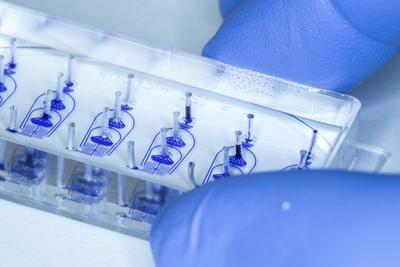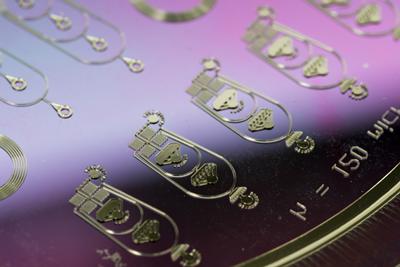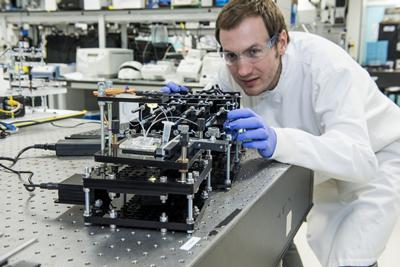Microfluidics in Medicine: IfLS team innovate single-cell sequencing

An interdisciplinary team of Institute for Life Sciences (IfLS) researchers has brought together expertise in microfluidics, mathematical modelling and medicine with potential to transform personalised healthcare.
Together they are building the know-how and instrumentation to make single-cell transcriptome sequencing accessible for all Southampton scientists.
Single-cell transciptome/ribonucleic acid (RNA) sequencing is a tremendously powerful Next Generation Sequencing (NGS) approach to resolve the diversity of individual cells underpinning their behaviour as populations.
Single cell sequencing has potential impact across a wide range of healthcare treatments, from skeletal stem cell differentiation for regenerative medicine, to cancer evolution leading to clones that can resist therapy. But until recently, its exorbitant cost made it unfeasible for everyday use.
However, a new DropSeq microfluidics protocol from Harvard markedly reduced these costs by encapsulating single-cells in droplets with barcoded beads that link the NGS data to the individual cells. The Southampton interdisciplinary hub has brought together the expertise required to rapidly adopt DropSeq and translate it into clinical research use.
Dr Matthew Rose-Zerilli, a cancer geneticist in Medicine, said: “Together we have established the full workflow from microfluidics, single-cell library preparation and next generation sequencing to the number-crunching bioinformatics and have already begun analysing challenging samples such as blood cancer, lung and oesophageal tumours.”
“In the future we would like to see this affordable technique being routinely used to monitor cancer patients. It would potentially be able to signal the emergence of resistant cancer cells and be used to direct the prescription of more effective chemotherapy and immunotherapies.”
The team has already made great strides in innovating the technology and removing the instrumentation costs. Dr Martin Fischlechner, an expert in droplet microfluidics and IfLS Research Fellow in Chemistry, has used an open hardware, do-it-yourself approach to create small footprint microscope platforms and precision syringe pumps that rival the performance of commercial instruments at around one per cent of the cost, from tens of thousands of pounds to a few hundred.
This pioneering approach has enabled DropSeq to be embedded in biomedical laboratories at Southampton General Hospital and a new Medical Research Council (MRC) Discovery project is enabling 12 research groups to pilot DropSeq and other droplet-fluidic approaches on a wide variety of biomedical research activities.
MRC project leader Deborah Mackay, Professor of Medical Epigenetics, in Medicine, said: “We aim to spread this new expertise to medical researchers across the University. As these protocols become more robust and clinically validated, they have the potential to transform personalised medical care.”
Dr Jonathan West, a microfluidics expert and IfLS Research Fellow in Medicine, said: “This is a great example of the power of pooling expertise. By embedding DropSeq in Southampton General Hospital labs we will enable our colleagues to tackle questions at the forefront of medicine.”
“As far as we know we are the first UK University to implement DropSeq and are now looking to create a UK hotspot for microfluidic single cell analytics.”

